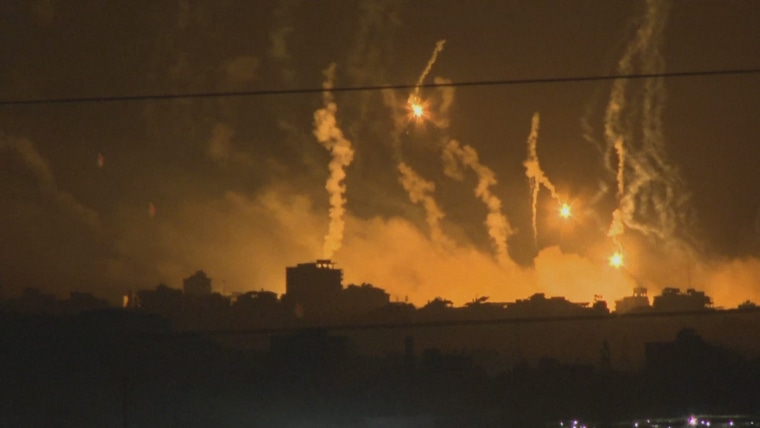Sen. John Fetterman, a Pennsylvania Democrat, was one of the most prominent American politicians to recently defend Israel from concerns that it is causing mass civilian casualties in the Gaza Strip by saying that Israeli forces “are not targeting civilians. They never have, they never will.”
Fetterman’s claim — a familiar one for anyone who follows the Israeli-Palestinian conflict — is meant to shield Israel from international condemnation and sanctions. But it’s a misleading one. There are many clear indications that Israel is denying the distinction between militants and civilians, allowing innocents to fall within the crosshairs as part of its bid to dismantle Hamas.
Even if civilians aren’t being deliberately targeted, they’re dying in extraordinary numbers.
Like all states, Israel has an obligation and a right to defend its citizens against security threats, and Hamas’ brutal war crimes on Oct. 7 demonstrated that the militant group posed a serious threat. The question is how a government goes about pursuing that self-defense. And in this case, that effort has included a strategy of ferocious domination that’s wreaking havoc on innocents.
Since Hamas’ massacre of Israelis on Oct. 7, Israel has dropped nearly as many bombs in Gaza — a small strip of land with about 20,000 people per square mile — as the U.S.-led coalition dropped over all of Afghanistan in its heaviest year of bombardment during the war there. The Israel Defense Forces have leveled extraordinary amounts of civilian infrastructure, hitting an untold number of buildings that include apartment buildings, hospitals, mosques, schools and U.N. shelters. Entire blocks have been turned to rubble, entire families have been wiped out. Israel’s military has killed more Gazan children in weeks than were killed in all conflict zones annually since 2019. It has killed more U.N. aid workers than in any other comparable period of its history. It has killed, according to the Committee to Protect Journalists, more journalists in the opening weeks of the bombing than over a similar period of time in any conflict since the committee began tracking them in 1992. Israel has claimed that it’s attempting to save civilian lives by telling Gazans to move south to avoid being hit — and then it has struck designated safe zones in the south, too. Many Gazans also can’t go south because of health or mobility constraints, or fear that they could be in even more danger if they do because they don’t know where they’ll stay or how they’ll survive.
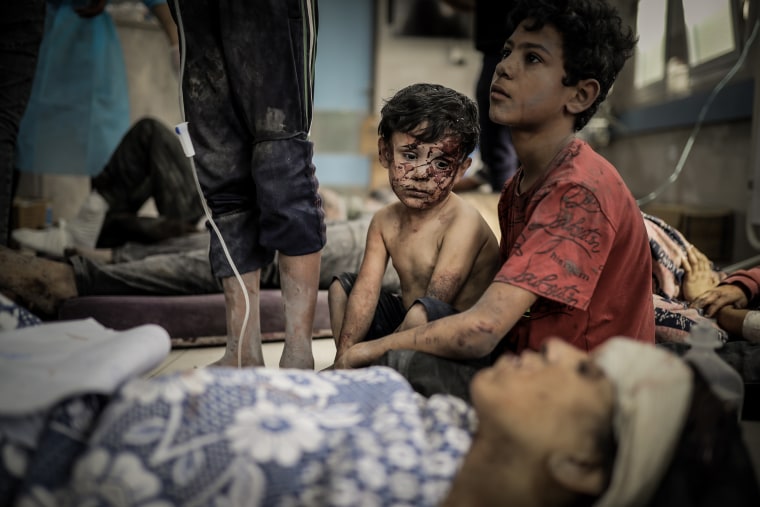
Israel has ostensibly conducted these strikes in a bid to kill Hamas militants who embed themselves in the civilian population, in violation of international humanitarian law. But the point is that even if civilians aren’t being deliberately targeted, they’re dying in extraordinary numbers. Gaza’s Hamas-run Ministry of Health reports that over 10,000 Palestinians have been killed by Israeli forces, some of whom are militants, but the overwhelming majority of whom are children or women. Those numbers have not been verified by NBC, but human rights organizations say they track with available evidence, the ministry’s estimates have been reliable in previous rounds of hostilities. In addition, the State Department uses them for internal reports, and the assistant secretary of State for Near Eastern Affairs said this week “it’s very possible” the numbers are higher.
Still, Israel’s policy of not targeting civilians is repeatedly cited by those defending Israel’s response to Hamas’ war crimes — including Israeli Prime Minister Benjamin Netanyahu’s administration, the Israel Defense Forces and the Biden administration.
Israel’s seemingly high tolerance for civilian casualties is tied in part to the way that Netanyahu sees security through the prism of domination of the Palestinian territories. Israel’s government is seeking complete regime change, “indefinite” occupation and partial annexation of a territory filled with people who are inclined to resist occupation. That goal requires massive firepower and guarantees the destruction of huge swaths of Gaza. But Israel has, among other options, the choice of a more narrowly focused counterterrorism strategy that would reduce casualties and involve rapid withdrawal.
Israel’s supporters mention the policy of not targeting civilians to draw a civilizational distinction between it and Hamas, which systematically targeted civilians, including children and infants, in its brutal war crimes on Oct. 7. But citing the policy is not a rebuttal as much as it is a diversion. To comply with international humanitarian law, a country is not only obligated to aim at military targets, but also to minimize civilian deaths. (This applies even if a country has been the victim of war crimes.) Specifically, the principle of proportionality dictates that a military weigh the anticipated military advantage of a strike against harm to civilians to ensure that harm isn’t excessive.
Israel’s collective punishment of Palestinians through its indiscriminate siege marks a de facto targeting of civilians.
“It’s a very tricky principle, how do you compare the harm to civilians and military advantage? It’s like comparing elephants and oranges, two different things,” Yael Stein, the research director at B’Tselem, an Israeli human rights organization, told me. It’s a moral gray area, and it’s also an ugly one: In effect, it involves a military asking how many civilian lives a specific military target could be worth. “It is not like mathematics, you don’t have one answer, you have some place to interpret [the principle of proportionality] in different ways, but there are limits to the interpretations of this principle,” Stein said. “What’s happening in Gaza is not part of the reasonable interpretations of the principle of proportionality.”
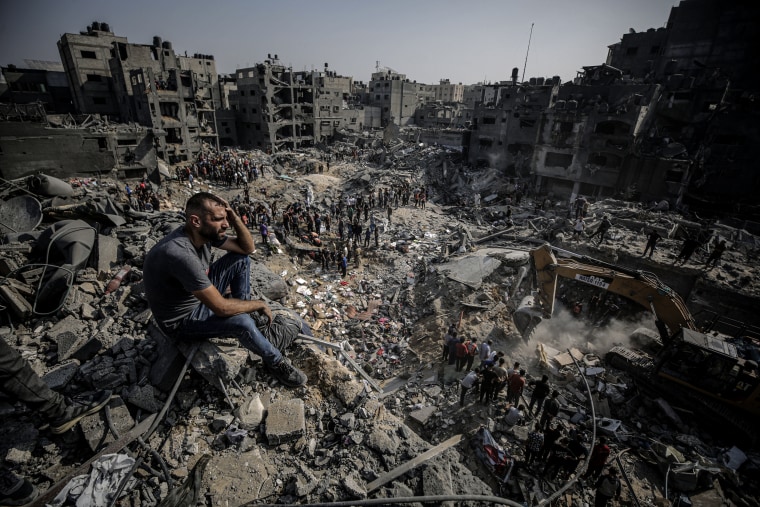
Immediately there were signs that Israel viewed its military operation as not just an operation for self-defense, but for inflicting excruciating pain on Gazans. As Netanyahu vowed “mighty vengeance” that would be felt for “generations,” Israel’s defense minister announced a siege, cutting off food, water, fuel, electricity and medicine to the entire Gaza Strip as part of its bid to fight those he called “human animals.” As Israel began aerial bombardment, an IDF spokesman said that “the emphasis is on damage, and not on accuracy,” and Israel’s president insinuated that no Gazan had the rights of a civilian as he bellowed that “it is an entire nation out there that is responsible.”
Rajan Menon, a professor emeritus of political science at The City College of New York, said in an email that Israel’s “excuse that the civilian deaths that result are not intentional wears thin” when mass civilian deaths in a densely packed urban environment are foreseeable. Mark Lattimer, the executive director of the Ceasefire Centre for Civilian Rights, said of an airstrike on the Jabalya refugee camp, which killed over 100 people (many of whom, according to local doctors, were women and children): “Because it was a planned attack, it shows that Israel must have a tolerance for civilian casualties which is orders of magnitude greater than that that was used by, say, the U.S. Air Force in the war against ISIS.”
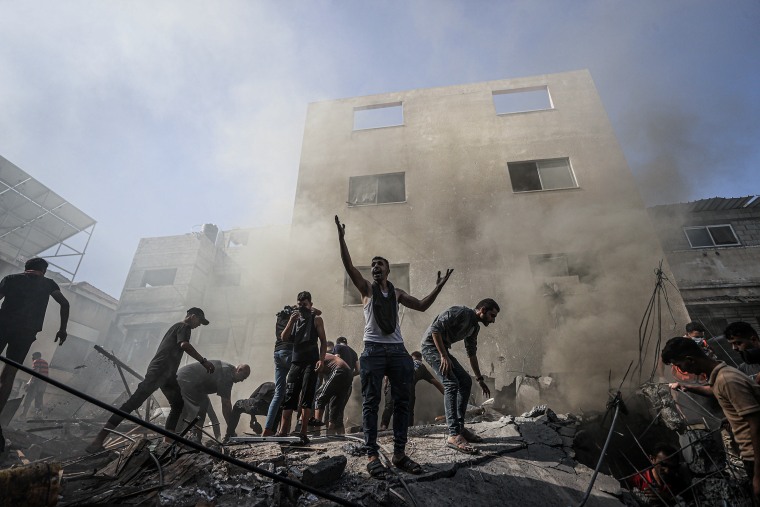
Israel’s collective punishment of Palestinians through its indiscriminate siege marks a de facto targeting of civilians. Israel has long controlled the flow of most supplies into Gaza, and it has cut off energy and reduced flow of humanitarian aid into Gaza to a tiny fraction of what it was before Oct. 7. The United Nations has condemned the siege and the reduced flow of aid, which has exposed millions of Gazans to acute food and water insecurity and illness and sabotaged the population’s ability to administer health care in a war zone. The human rights observer Euro-Med Human Rights Monitor said that Israel is waging a war of starvation and that only 2% of the aid that’s been needed in Gaza has been getting through. This is why human rights observers and scholars of genocide — including a number of Israelis — are sounding the alarm about crimes against humanity, and why Brown University’s Omer Bartov told MSNBC that “the possibility of genocide is staring us in the face.”
Some on the Israeli left have called for a cease-fire, the release of the hostages and political negotiations, but they hold little political power in Israel. Yet even if Israel refuses to consider a cease-fire, there are alternatives, defense policy experts say. Israel can end its policy of humanitarian deprivation. It can commit to a lower tolerance for civilian casualties in its rule of engagement, raise the threshold for intelligence about an area before strikes, and provide more warnings — and actually accurate warnings — about where it will strike. It can rely more on special forces raids. Israel will say this will diminish its military efficacy. But it will also save lives.
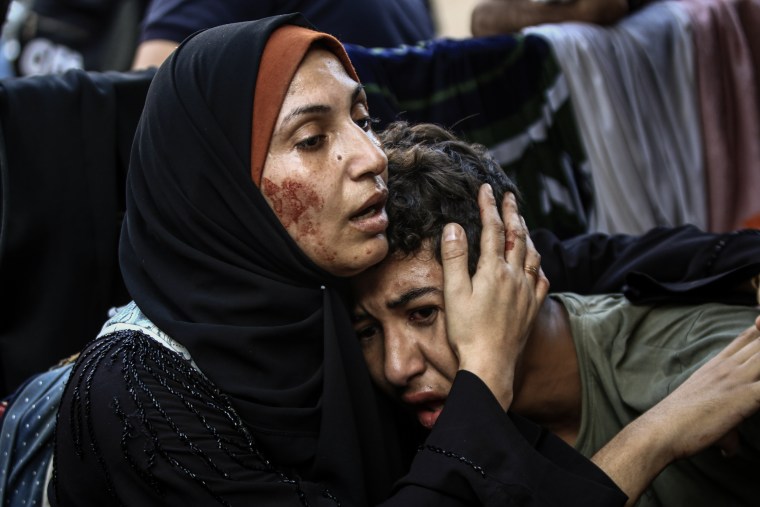
Disturbingly, the Biden administration has said there’s no red line Israel can cross when it comes to the number of civilian casualties. But one cannot endlessly dismiss the horrifying realities of people being bombed, starved and besieged with a flippant “Israel isn’t targeting civilians.” One’s stated intentions do not exempt them from responsibility for the foreseeable consequences of one’s actions. That’s not only a matter of international law. It’s moral common sense.
